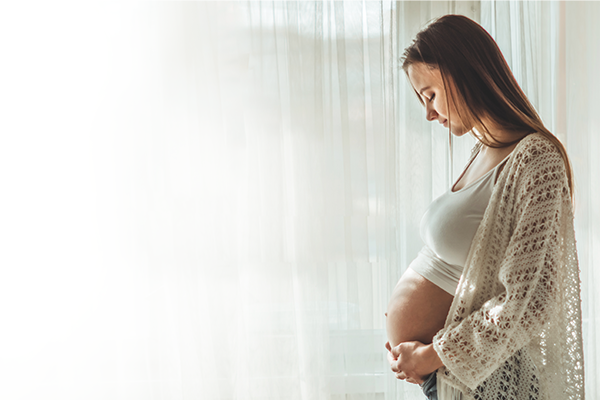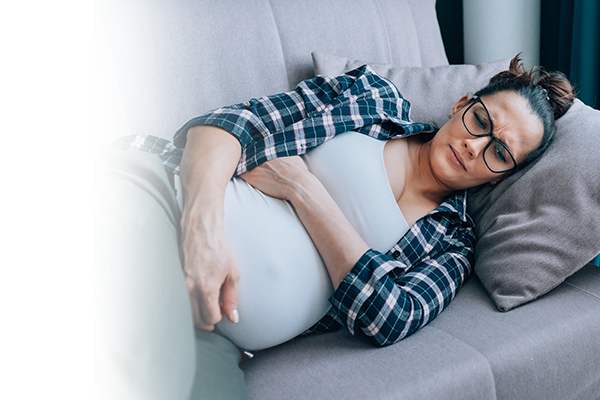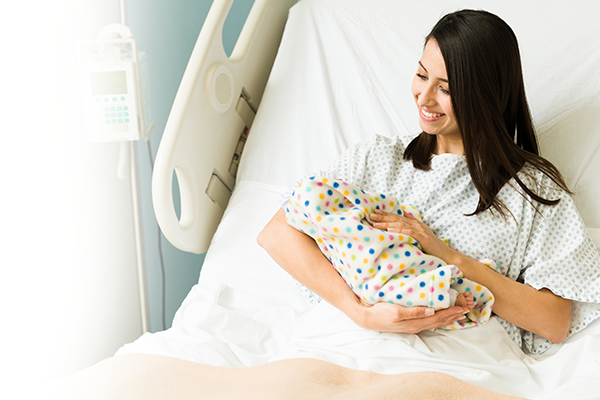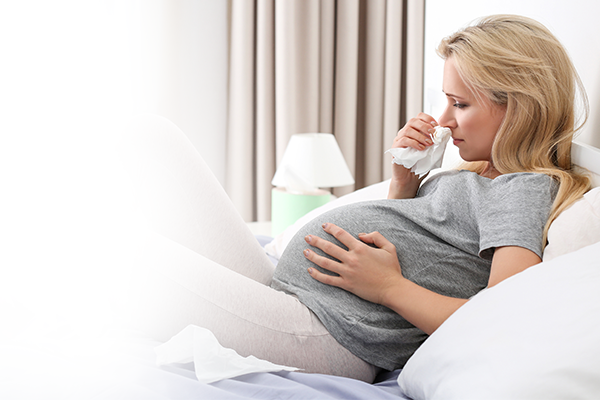The eleventh week of pregnancy is the time to perform the first ultrasound, checking that the baby is developing properly and the mother-to-be is feeling well. Many pregnancy discomforts arise during this period, but it is nevertheless advisable to start exercising the Kegel muscles and take a course at a birthing school. This is also a key time to start planning for further prenatal care and prepare for the changes that the second trimester brings. In addition, mothers-to-be can use this time to increase their knowledge of pregnancy and motherhood, which can help them better understand and accept the upcoming changes.
Week 11 of pregnancy – belly size and other changes in mom and baby
The belly at 11 weeks of pregnancy may already be rounded, especially in the lower parts. Because of this, bloating and constipation are often troublesome, and weight also increases. However, it is a signal of the proper process of growth of the toddler, in which a working heart or the first movements of the limbs are observed. In addition, organs such as the heart, spine, stomach and bladder can be observed in the toddler. How many centimeters the baby is at 11 weeks is determined by individual factors, but usually the baby measures about 5 centimeters and weighs close to 10 grams.
Changes in appearance and pregnancy ailments
As a result of the dynamic development of the baby, the mother-to-be may observe the first changes in her appearance, as well as experience further discomforts, resulting from the physiology of pregnancy.
The 11th week of pregnancy often brings with it the characteristic symptoms of this period, which are the result of both hormonal and physical changes. It is worth knowing them to better understand your own body in 11 . week of pregnancy and respond appropriately to emerging symptoms.
The most common symptoms and ways to deal with them:
- Nausea and vomiting – although for many women the nausea is beginning to subside, for some it can still be a problem. Eating small, frequent meals and avoiding foods with strong odors can help;
- Bloating and constipation – hormonal changes can slow down the digestive process, leading to bloating and constipation. Eating plenty of fiber, drinking enough water and regular mild physical activity can help alleviate these symptoms;
- Fatigue – high levels of progesterone can cause drowsiness and fatigue. It is important for mothers-to-be to allow themselves to rest and ensure that they get enough sleep;
- Emotional changes – mood swings are typical for this period of pregnancy, so it is important to have emotional support from loved ones and to take care of your own well-being;
- Headaches and dizziness – these symptoms can result from a variety of causes, including changes in blood pressure. It is important to avoid dehydration and keep blood sugar levels steady.
It is always advisable to consult a doctor in case of worsening or worrisome symptoms. This should be done especially in case of severe abdominal pain, bleeding or any other situation that seems unusual or worrisome.
Beauty changes during pregnancy
As for the 11th week of pregnancy, the symptoms also include beauty changes. Hair density increases, the condition of nails improves, breasts become fuller, and pimples and blemishes may appear on the skin, although the complexion may also become smoother and look better than before. In addition, most moms-to-be complain about weight gain. Some moms-to-be notice the presence of a darker area along the white crease on the abdomen. This is linea negra – a type of physiological pigmentation change associated with an increase in progesterone. It is not uncommon to notice increased saliva production in the mouth, susceptibility to heavy plaque buildup, and hypersensitivity of the gums and a tendency for their mucous membranes to become damaged during brushing.
What does the baby look like at 11 weeks of pregnancy?
At 11 weeks of pregnancy, the baby straightens from its previous embryonic position. The torso becomes longer, as do the limbs, and the neck becomes more slender. Nail beds begin to form on the fingers, the thumb arranges itself in opposition to the other fingers and begins to take part in clenching the fist, and hair follicles form on the palms. The auricles are preforming, the closed eyelids are covering the not yet fully developed eyeballs, and a prominent chin is being drawn at the base of the face.
Activity and sexual development of the baby at 11 weeks of pregnancy
Between 10 and 11 weeks of pregnancy, the toddler begins to show the ability to extend and retract his tongue, as well as make gentle movements with his legs and arms. However, the gestures are not perceptible by the mom, but can be observed during a 4D ultrasound at 11 weeks of pregnancy. In addition, at the end of the first trimester, the process of genital differentiation takes place. In boys, testosterone production in the testicles begins, making it possible, among other things. penis formation. In girls, the ovaries are developing, and a little later the external genitalia will appear.
Week 11 of pregnancy – how to train pelvic floor muscles during pregnancy?
The eleventh week of pregnancy is a good time to start exercising Kegel muscles. Due to their complex anatomy, the muscles of the pelvic floor not only close the pelvic outlet from below, but also perform many motor functions. The springy, strong and flexible Kegel muscle plays a special role especially during childbirth and the postpartum period.
Training teaches bladder function control and prevents incontinence, which can cause not only unsightly discoloration on underwear or bad odor, but also psychological discomfort. In addition, the exercises develop the ability to consciously tighten and relax the lower parts of the body, so they also have a beneficial effect on intestinal peristalsis in the last part of the gastrointestinal tract and on the process of defecation. This type of activity also prepares the birth canal for increased exertion during labor and induces a sense of security and comfort in the mother. Continuing sessions after childbirth, in turn, accelerates the recovery of tired pelvic floor tissues, and allows you to regain your shape and sexual performance and satisfaction faster.
The exercises involve tensing the muscles of the vaginal and anal orifices simultaneously for a set period of time. It is best to start them in the supine position and maintain the contraction for 5 seconds in 10 repetitions and 4 series during one workout. As you master the technique and gain experience, it’s a good idea to increase the time of muscle tension by 2-4 seconds and adopt other positions, such as supported and straight kneeling, flat or kneeling sit, as well as perform training while walking and performing daily activities.
Optional and mandatory examinations – their type and importance in 11. week of pregnancy
W 11. Week of pregnancy standard examinations include the first ultrasound to assess the health of the baby and the progress of the pregnancy. This test also allows to confirm the date of delivery, check the number of fetuses and assess the risk of certain genetic defects. In addition, blood and urine tests that monitor the overall health of the mother-to-be are also standard.
In addition to the standard tests, in the 11th. A week of pregnancy is also recommended for more detailed prenatal testing, which may include the PAPP-A test and fetal nuchal translucency testing. These tests, while not mandatory, are important for assessing the risk of certain genetic defects, such as Down syndrome.
In the context of planning for the child’s long-term health, it is also worth considering the option of collecting cord blood immediately after birth. Cord blood is a rich source of stem cells that can be used in the future to treat a variety of conditions. Although this survey is not conducted in the 11th. week of pregnancy, it is worth considering this option now. Storing cord blood in a stem cell bank gives Parents an added sense of security by offering potential treatment options for certain diseases.
Mental and emotional health in 11. week of pregnancy
From the 11th, week of pregnancy, many women begin to experience significant changes in their emotional and mental well-being. Pregnancy hormones, such as estrogen and progesterone, can affect mood, causing emotional fluctuations. Many women experience increased sensitivity, anxiety and even brief episodes of sadness or euphoria during this period.
Emotional support during this time is crucial. Moms-to-be may need more understanding and empathy from their partner, family and friends, as in extreme cases, depressive symptoms can be quite exacerbated. It’s also a good idea to join pregnancy support groups, which offer a space to share experiences and feelings with other women in a similar situation.
At this stage of pregnancy, taking care of mental health is as important as taking care of physical health. Practices such as meditation, light yoga for pregnant women, breathing techniques or simple relaxation exercises can significantly help maintain emotional balance. In addition, if the mother-to-be is experiencing severe anxiety or depression, it is advisable to consult a professional therapist or psychologist.
The 11th week of pregnancy is also a good time to start preparing for the upcoming life changes after the baby is born. Planning for the future, organizing the home to welcome a new family member, and discussing plans for childbirth and motherhood can bring relief and a sense of control, which has a positive effect on mental health.
FAQ:
- What is the size and weight of the baby at 11 weeks of pregnancy?
W 11. Week, or the third month of pregnancy, the baby usually measures about 5 cm from head to buttocks and weighs close to 10 grams. This is a time of rapid growth for the baby, where it begins to look more and more like a small human being, and its major organs continue to develop.
- What symptoms appear in the 11th. Week of pregnancy?
The most common symptoms in 11. Week of pregnancy is nausea (often mild), fatigue, bloating, constipation and frequent urination. Emotional changes and increased appetite may also occur. Some women notice changes in appearance, such as a rounded belly or skin changes.
- The 11th week of pregnancy – what month of pregnancy is it?
The eleventh week of pregnancy falls at the end of the third month. This is the last stage in the first trimester of pregnancy, which is a key moment in the development of the fetus. Many key organs and structures of the baby’s body begin to function, and the risk of some complications decreases.
Rate this article:









